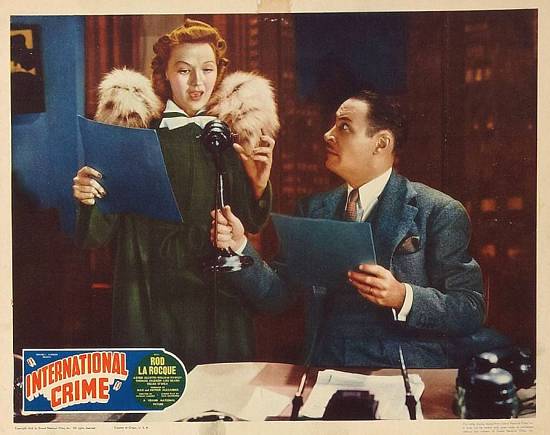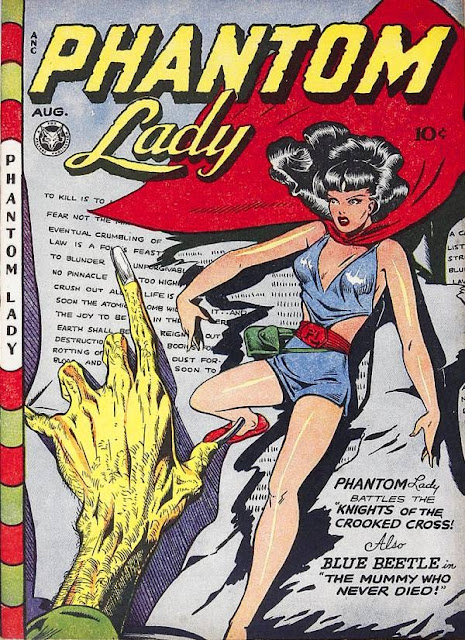I expected to hate this movie. After all, I didn’t think much of the first in the series, The Shadow Strikes (reviewed HERE), and I’d heard that in this one, The Shadow doesn't even bother to don his costume.
Well, garsh, I was wrong - at least about hating it. Though International Crime (1938) is in no wise faithful to any other incarnation of The Shadow, it’s an all-around fun movie, and interesting on several levels.
First, the weird parts. Unlike the pulp Shadow, our hero in this one is the genuine Lamont Cranston, and is a prizefighting newspaperman. But that’s not all. From his office at the The Daily Classic, he does a daily radio broadcast, with a faithful following of cops, crooks and “millions” of other folks. On the radio he calls himself The Shadow (though his identity is by no means a secret) and his newspaper column is called “The Shadow Says.” The police resent him, but he thinks he’s helping them by advertising that Crime Doesn’t Pay. And as advertised - he never bothers with a black hat or cloak.
Unlike the radio Shadow, this Cranston does not have the power to cloud men’s minds, and does not have a beautiful and faithful companion named Margo Lane. His companion here is a beautiful pain-in-the-neck named Phoebe Lane, who wants to break into crime reporting, and calls herself as “The Shadow’s shadow.” Cranston is less enthusiastic about the relationship. “Miss Lane,” he asks her, “why didn’t you stick to the babies and biscuits end of the newspaper business instead of hurling yourself into the jaws of death?”
There are some nice touches. The image of The Shadow on the newspaper column is the same one used for the Shadow Club pin and insignia in the pulps. The Shadow's cabbie Moe (never called "Shrevy") is on hand, and forced to pretend Cranston is a stranger to him. At a scene outside a movie theater, we see a poster for Here’s Flash Casey. And at one point we have this exchange, after which both actors smirk:
Pheobe: “What are you going to do?”
Cranston: “I don’t know.”
Pheobe: “You don’t know?”
Cranston: “That’s right. The Shadow doesn’t know.”
For me, the biggest and best surprise of the film was the comedy. The Cranston-Pheobe relationship was clearly influenced by the success of the first two Thin Man films, released in 1934 and 1936. Rod LaRocque does surprising well in Nick Charles-mode, and Astrid Allwyn (whom I’d never heard of) does a fair impression of Nora. They keep up a steady banter as she, like Nora, tries to help in the investigation while he, like Nick, tries to keep her out of harm’s way. There’s even a snatch of racy dialogue in the back of a cab.
Cranston: “Young lady, you’re impossible.”
Pheobe: “Not if the right man comes along.”
To which Cranston delivers a very Nick-like look of shock.
And the dialogue is surprisingly good throughout. At one point, when Commissioner Weston orders Cranston put in handcuffs, The Shadow says, “Oh, never mind those things. I don’t go in for flashy jewelry.” And when Cranston tells Pheobe to go home and get dressed so they can go night-clubbing, we have this exchange.
Pheobe: “Now let’s see… shall I wear black or blue?”
Cranston: “You’ll wear both black and blue if you don’t hurry. Scram, sister!”
The plot? Oh, it has something to do with bankers and bonds and agents of a foreign power, but all of that's incidental. The important thing is that this is a mash-up between The Shadow and the Thin Man, and that’s two great things that - amazingly - go great together.
Not convinced? See the whole film here:
For the finest in Overlooked Films, tune in each week at this time to SWEET FREEDOM.


















































